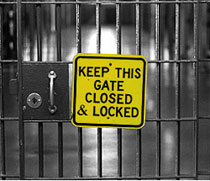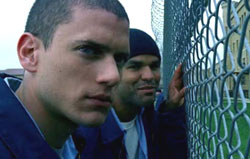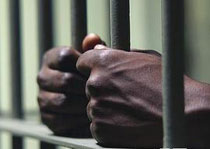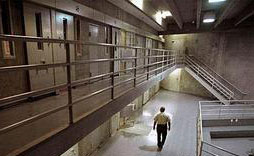Prison Break 1《越狱》1(精讲十二)
影片对白
 T-bag: That baby boy all growed up yet? Oh, he's gonna raise hell the next few years. Take after his mama. Yeah, you know, it's the same old same up here. But, uh... things are getting pretty tense, like they're fixin' to, uh, collide. You know what I mean, Jimmy? There's a potential, uh, situation.
T-bag: That baby boy all growed up yet? Oh, he's gonna raise hell the next few years. Take after his mama. Yeah, you know, it's the same old same up here. But, uh... things are getting pretty tense, like they're fixin' to, uh, collide. You know what I mean, Jimmy? There's a potential, uh, situation.
Michael: I found our access to the infirmary building, but I'm gonna need some time to make it work.
Lincoln: How much time?
Michael: Enough for me to find my way up a 20-foot vertical drain pipe without using a ladder. I'll probably need to skip PI tomorrow if I want to get this thing done.
Lincoln: You can't just skip it. It ain't class. What if one of the bulls decides to drop in?
Michael: Well, I don't have a choice, do I? Once we get through the pipe below the guards' room, it will be a whole lot easier. I can come and go without using the door, and with Westmoreland as a lookout, we'll have one more man available for digging.
Lincoln: Westmoreland's gonna be a problem. All seven of us can't break over that wall in 18 minutes. You said it yourself: it's impossible. Listen, man, I'm telling you, one of us has got to take a hike.
Michael: I know.
C-note: Mind if I share that with the rest of the class? Apparently, College Boy here did the math. Figured out that we got too many clowns in the car. So, one of us is in here digging, but his seat ain't guaranteed.
Lincoln: How is this your problem, man?
Michael: He doesn't know what he's talking about.
Sucre: I'm not gonna dig if I'm not gonna go.
Lincoln: We need to make a decision on who gets cut.
Abruzzi: Well, I think we can all agree who that should be. Right?
T-bag: Oh, pardon me for interrupting. But, uh... what's that smell? It smells a little like... conspiracy.
Michael: We need to get back to work.
T-bag: Yeah, before you do, I have an announcement to make. I've been growing leery of the way y'all talk, like I'm a lesser man. So, I bought an insurance policy. I called up my guy on the outside, and I told him about our plan. And I told him, in all likelihood, I'll be seeing him next week, but... if he don't hear from me five minutes before the escape, and 20 minutes after, I told him to call up the warden, blow the whistle on the whole thing. So if you all got ideas about getting rid of me... I suggest you make other plans.
妙语佳句,活学活用
1. Raise hell
Raise hell是个俚语,它有几种意思:
1) to create an uproar大发雷霆,发火;例如:She'll raise hell when she sees what your rabbit has done to her garden.
2) Behave in a rowdy or disruptive way 捣乱,搞破坏:例如:The wind raised the devil with our picnic.
Raise hell 这个片语也写作raise Cain / raise the devil,Raise Cain来自于亚当和夏娃的儿子亚伯,他杀死了他的兄弟Cain(该隐)。据跟St. Louis Daily Pennant (May 2, 1840): "Why have we every reason to believe that Adam and Eve were both rowdies? Because ... they both raised Cain.". This statement makes a pun on raise, meaning "bring up" or "nurturing." 之后渐渐演变出 raise hell 和raise the devil这个两个变体。
2. Skip
相信大家做学生的时候一定都翘过课,那么这个"翘课"怎么说呢?就是skip a class,例如: Michael skipped a class last week.
3. Take a hike
Take a hike 除了表示"远足",在俚语中还表示"To leave because one's presence is unwanted(让某人)离开",通常用于祈使句,例如:I've had enough of you--take a hike!
这个片语还写作take a walk,例如:I don't need your advice, so take a walk. 此外take a walk 还表示"突然地离开并且没有回来的可能",例如:If he doesn't get his way, he takes a walk.
文化面面观
Prisoners' Rights in the U. S. 美国监狱中犯人的权利
看《越狱》这部电视剧,很多人一定会对美国监狱中犯人的权利感到惊奇,比如在放风的时候可以随便打电话、可以去教堂做礼拜、享受免费医疗等等。那么,囚犯们在美国监狱中究竟享有什么样的权利呢?下文为我们展示了一些美国监狱中的情况。
 Prisoners' rights are limited. For the most part, jail and prison inmates may demand only a "minimal civilized measure of shelter" (Union County Jail Inmates v. DiBuono, 713 F.2d 984 [3d Cir. 1983]). Generally, courts follow three basic principles when deciding whether to recognize a particular right. First, an inmate necessarily gives up many rights and privileges enjoyed by the rest of society; second, an inmate does not relinquish all constitutional rights upon placement in prison; and third, the constitutional rights retained by the prison inmate must be balanced against the security concerns of the prison.
Prisoners' rights are limited. For the most part, jail and prison inmates may demand only a "minimal civilized measure of shelter" (Union County Jail Inmates v. DiBuono, 713 F.2d 984 [3d Cir. 1983]). Generally, courts follow three basic principles when deciding whether to recognize a particular right. First, an inmate necessarily gives up many rights and privileges enjoyed by the rest of society; second, an inmate does not relinquish all constitutional rights upon placement in prison; and third, the constitutional rights retained by the prison inmate must be balanced against the security concerns of the prison.
The established rights of prison inmates include freedom of speech and religion; freedom from arbitrary punishment (i.e., restraints, solitary confinement) on the sole basis of beliefs, religion, or racial and ethnic origin; freedom from constant physical restraints; a small amount of space for physical movement; essentials for personal hygiene and opportunity to wash; clean bedding; adequate clothing; adequate heating, cooling, ventilation, and light; and adequate nutrition.
Prisoners' rights can be infringed for security purposes. Prisoners have the right to freedom of speech, but prison officials may search their mail, deny a wide variety of reading materials, and edit the content of prison newspapers. Prisoners have the right to adequate space, but they may be confined in isolation for long periods, even years. Prisoners have the right to freedom from restraints, but their ankles and wrists may be shackled when they are moved. They may also be temporarily strapped down or otherwise restrained if officials believe that they present a danger.
Prison inmates often attempt to establish new rights in court. Issues such as prison overcrowding, medical treatment, media access, even exposure to secondhand cigarette smoke, are among the issues courts face.
 Another sensitive issue in prison is the use of prison guards of the opposite sex. Women prisoners may receive more privacy in this regard than men prisoners. For example, the Ninth Circuit Court of Appeals held in 1985 that the practice of assigning female guards to conduct strip searches on nude men and watch them while showering, urinating, and defecating did not violate any constitutional rights (Grummett v. Rushen, 779 F.2d 491 [1985]). However, in 1993, the same court held that it was cruel and unusual punishment to allow male guards to conduct searches on female prisoners while the female prisoners were clothed (Jordan v. Gardner, 986 F.2d 1521 [9th Cir. 1993]).
Another sensitive issue in prison is the use of prison guards of the opposite sex. Women prisoners may receive more privacy in this regard than men prisoners. For example, the Ninth Circuit Court of Appeals held in 1985 that the practice of assigning female guards to conduct strip searches on nude men and watch them while showering, urinating, and defecating did not violate any constitutional rights (Grummett v. Rushen, 779 F.2d 491 [1985]). However, in 1993, the same court held that it was cruel and unusual punishment to allow male guards to conduct searches on female prisoners while the female prisoners were clothed (Jordan v. Gardner, 986 F.2d 1521 [9th Cir. 1993]).
Prisoners retain some rights aside from those concerning living conditions. Most prisons "classify" prisoners and place them in various units according to the categories. For example, violent criminals and persons suspected of gang affiliations are often housed in high-security areas of prison, separate from the rest of the general prison population. When an inmate is reclassified, he or she is entitled to notice of the reclassification and a citation of reasons for the move.
Congress and most states authorize the allowance of "good time" for prison inmates. Good time is credit for time served on good behavior, and it is used to reduce sentence length. For example, an inmate may receive one day of good time credit for every three days that he behaves well. Other states withhold recognition of good behavior until the defendant has served a certain portion of the minimum sentence imposed by the court. In New Hampshire, for example, an inmate may be released for good behavior after serving two-thirds of the minimum sentence (N.H. Rev. Stat. Ann. § 651-A:12 [1983]). When an inmate has good time credits taken away, she or he is entitled to notice, a hearing before the prison board, and an opportunity to present evidence in her or his favor.
 Inmates may also gain early release from prison through parole, which is granted by the parole board. Prisoners have no right to parole, and the matter of early release is left to the graces of the parole board. Once released on parole, a parolee may be returned to prison for breaking one of the many conditions that are normally imposed. A parolee has no right to an attorney at a parole revocation hearing, nor does an inmate have the right to an attorney at a parole hearing.
Inmates may also gain early release from prison through parole, which is granted by the parole board. Prisoners have no right to parole, and the matter of early release is left to the graces of the parole board. Once released on parole, a parolee may be returned to prison for breaking one of the many conditions that are normally imposed. A parolee has no right to an attorney at a parole revocation hearing, nor does an inmate have the right to an attorney at a parole hearing.
Solitary confinement is used in many prisons for violent inmates and those inmates perceived as having gang-related affiliations. Some prisons are designed specifically for it. The original prisons, as envisioned by the Quakers, called for solitary confinement, but the practice was halted because of the detrimental effects it had on prisoners. However, the practice never completely ended. In the 1980s solitary confinement became a regular feature of prisons, and it has become the sole form of incarceration in so-called Security Housing Units or Supermax prisons.
In a Supermax prison, the cells are eight-by-ten feet and windowless. The cells are grouped in "pods." The cell doors are perforated with holes large enough for guards to see inside the cell, but small enough to obstruct the prisoner's vision and light. All a prisoner can see through the door is another white wall. Each cell is furnished with a built-in bunk with a toilet-sink unit. Nothing is allowed on the walls. Prisoners may be allowed television, radio, and books, but these are taken away as punishment for any rule infractions.
 Prisoners in solitary confinement are kept in their cells, under surveillance, for twenty-two-and-a-half hours a day. Unlike the rest of the prison population, inmates in solitary confinement may not take advantage of educational or recreational programs. The ninety minutes outside the cell may be divided between visiting a small library, washing, and exercising in a pen connected to the pod. Prisoners are strip-searched by the guards before and after visiting any place and are placed in waist restraints and handcuffs when being escorted.
Prisoners in solitary confinement are kept in their cells, under surveillance, for twenty-two-and-a-half hours a day. Unlike the rest of the prison population, inmates in solitary confinement may not take advantage of educational or recreational programs. The ninety minutes outside the cell may be divided between visiting a small library, washing, and exercising in a pen connected to the pod. Prisoners are strip-searched by the guards before and after visiting any place and are placed in waist restraints and handcuffs when being escorted.
The assignment of a prisoner to solitary confinement is made by prison officials. In assigning supposed gang members to solitary confinement, it is the policy in some prisons to require that the perceived gang member "debrief" officials on his or her gang activity and renounce his or her gang affiliations before being released back into the general population.
One of the most important rights possessed by prison inmates is access to the courts through habeas corpus petitions. After an inmate has exhausted all the motions and appeals available to contest the conviction and prison sentence, a final round of limited judicial review is provided through the writ of habeas corpus. Through the ancient writ of habeas corpus, a court may order the release of a prisoner wrongly held.
Habeas corpus petitions are granted only for certain constitutional violations in the prosecution of a criminal defendant. The Anti-Terrorism and Effective Death Penalty Act of 1996, 28 U.S.C.A. § 2261 et seq., placed certain limits on this form of relief.
温特沃斯·米勒:艰苦的成名路
 Wentworth Earl Miller III (born June 2, 1972) is an English-born American actor who achieved fame as Michael Scofield in the FOX television series Prison Break.
Wentworth Earl Miller III (born June 2, 1972) is an English-born American actor who achieved fame as Michael Scofield in the FOX television series Prison Break.
Biography
Miller's father is of African-American, Jamaican, English, German Jewish, and Cherokee descent, and his mother is of Russian, French, Dutch, Syrian, and Lebanese descent. He was born in Chipping Norton, Oxfordshire, England where his father, a Rhodes Scholar, was studying.
In an interview, Miller said: "My father is black and my mother is white. Therefore, I could answer to either which kind of makes me a racial Lone Ranger, at times, caught between two communities."
Career
Miller's first starring role was as the sensitive and introverted David in ABC's mini-series Dinotopia. After appearing in a few minor television roles, Miller moved on to co-star in the film The Human Stain (2003), playing the younger version of Anthony Hopkins' character.
Miller further increased his profile in 2005 by obtaining the starring role as Michael Scofield in Fox Network's television drama, Prison Break. His performance in the show earned him a 2005 Golden Globe nomination for Best Actor in a Dramatic Series.
Also in 2005, Miller made appearances in the music videos of Mariah Carey's "It's Like That" and "We Belong Together". Both music videos were directed by Brett Ratner, who directed the series pilot of Prison Break. According to Brett Ratner on the DVD audio commentary for the "Pilot" episode of Prison Break, Wentworth Miller auditioned for the role of Superman/Clark Kent when the Superman Returns project was still under Ratner's directorial control.
Filmography
Year
Title
Role
Notes
Television
2005-present
Prison Break
Michael Scofield
TV series
2005
Ghost Whisperer
Sgt. Paul Adams
Season 1, episode 1 - "Pilot"
2005
Joan of Arcadia
Ryan Hunter
Season 2, episode 21 - "Common Thread"
Season 2, episode 22 - "Something Wicked This Way Comes"
2002
Dinotopia
David Scott
TV miniseries
2000
ER
Mike Palmieri
Season 7, episode 1 - "Homecoming"
2000
Time of Your Life
Nelson
Season 1, Episode 6 - "The Time the Truth Was Told"
Season 1, Episode 11 - "The Time They Got E-Rotic"
2000
Popular
Adam Rothchild Ryan
Season 1, episode 16 - "All About Adam"
Season 1, episode 18 - "Ch-Ch-Changes"
1998
Buffy the Vampire Slayer
Gage Petronzi
Season 2, episode 20 - "Go Fish"
Film
2005
Stealth
voice of EDI
2005
The Confession
Prisoner
Short film
2003
Underworld
Dr. Adam Lockwood
2003
The Human Stain
Young Coleman Silk
2001
Room 302
Server #1
Short film
2000
Romeo and Juliet
Paris
考考你
用今日所学将下面的句子译成英语。
1. 这个团伙那天晚上出去搞破坏了。
2. 他说如果他们不还钱给他的话,他就要搞点动作。
3. 如果她还是那么粗鲁的话,我就离开。
Prison Break 1《越狱》1(精讲十一)考考你 参考答案
1. 他总是认为做人要诚实。
He always believed in putting his cards on the table.
2. 我想你应该和你的同事搞好关系。
I think you should get off on the right foot with your colleagues.